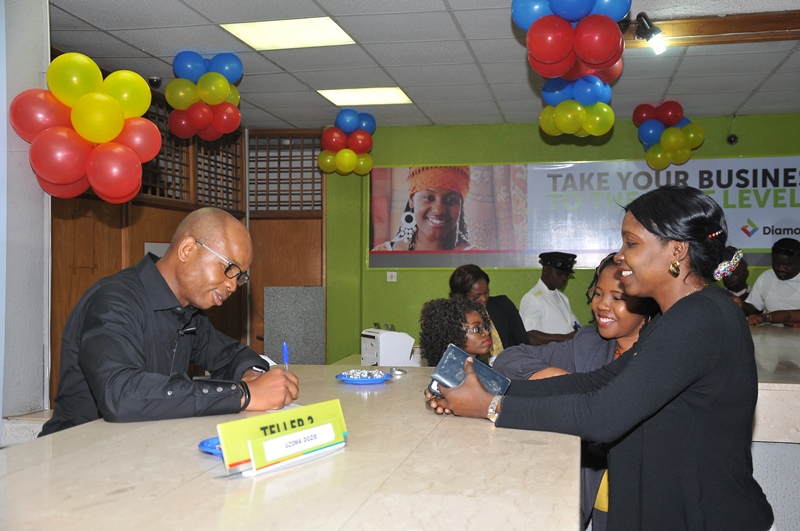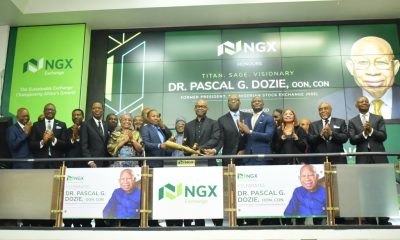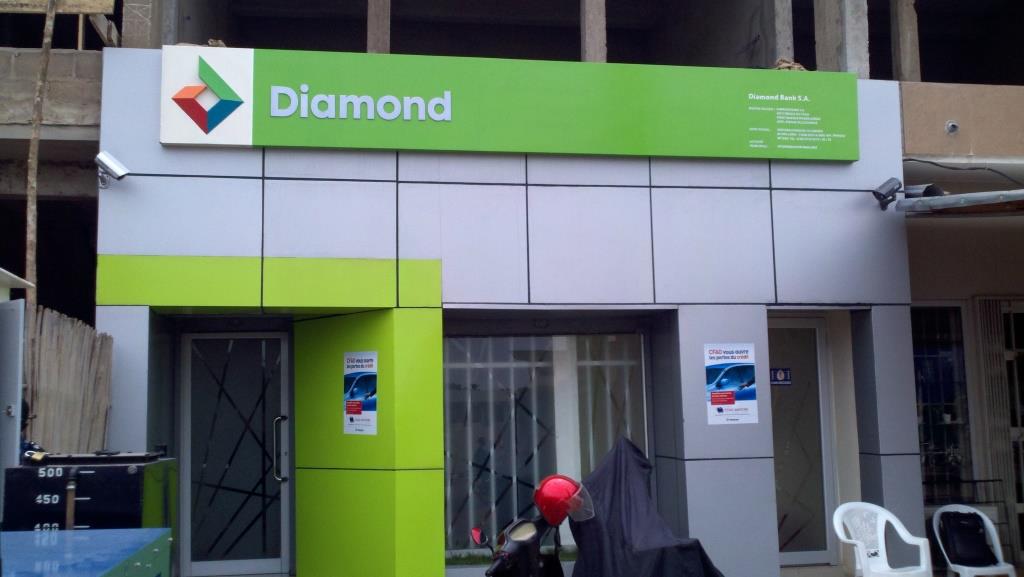Feature/OPED
Diamond Bank: Battling for Survival Under Uzoma Dozie

By Bamidele Ogunwusi
The last four years have not been years with more of good news for Diamond Bank, one of Nigeria’s wholly indigenous banks that emerged in the banking architecture of the country in December 1990.
Since it started operations in 1991, the bank has challenged the market environment by introducing new products, innovative technology and setting new benchmarks through international standards. At a point, the bank was Nigeria’s fastest growing retail bank.
For fourteen years, the bank was under the control of its founder, Mr Pascal Dozie, who was also the Chief Executive Officer of the bank. The fourteen years, according to many stakeholders, were the formative years of the bank and the bank indeed rose to the occasion churning out several innovations.
He relinquished the Chief Executive position to Mr Emeka Onwuka at the end of 2005. His exit would however be heralded with improved performance of the bank, which recorded a profit of N5.445 billion for the year 2005.
Onwuka, who took over effectively from January 2006 and handed it over to Alex Otti in 2011 and later to the son of the founder, Uzoma Dozie in March 2014.
The Otti’s years as Managing Director of the bank was referred to as the golden era and the most productive in the history of the bank.
Diamond Bank in Numbers
The period between 1991 and 2000, the bank tried to make its mark in the murky waters of the banking industry in the country and from 2000 the bank began to see improvements in its performance.
In 2001, the bank reported a loss after tax of N467.819 million while there was an improvement in its performance the following year when it reported a loss after tax of N134.960 million. This greatly improved in 2003 when it posed a profit after tax of N903.411 million.
This steadily grew to N7.086 billion at the end of 2007 financial year. It was N2.508 billion in 2004, N5.44 billion in 2005 and N3.977 billion in 2006.
This leaped to N12.821 billion in 2008, while bad loans brought the operations of the bank on its knees in the subsequent two financial years when profit dropped to N1.328 billion in 2009, a loss of N11.214 billion in 2010, another loss after tax of N13.940 billion in 2011.
There was, however, a resurgence in 2012 when the bank posted a profit after tax of N22.108 billion , the first full year in the Alex Otti’s leadership of the bank.
Under Dr. Otti’s leadership, Diamond Bank made a remarkable return to profitability with impressive growth across all performance indicators year-on-year.
After writing off toxic risk assets, which resulted in the loss of N16 billion in 2011, the lender posted a profit before tax of N28.36 billion in 2012 and N32.5 billion in 2013. The bank also saw its total assets rise from N564.9 billion in February 2011 to N1.18 trillion by December 31, 2012 and N1.52 trillion on December 31, 2013.
He is credited with creating the office of the Chief Risk Officer and designating an Executive Director to head the department. He also spear-headed the expansion of the bank by doubling the full staff count from around 2,000 in 2010 to over 4,000 as at mid-2014, even as he vigorously grew the bank’s footprints from a network of 210 branches in 2011 to over 265 branches three years later. It was also under his watch that the bank established an international subsidiary in the United Kingdom, in addition to expansion in Francophone West Africa (Senegal, Togo, and Ivory Coast).
It is to be noted that the Central Bank only recently classified the bank as one of the eight systematically important banks in Nigeria under his watch.
Since the current MD, Uzoma Dozie took over the leadership of the bank in March 2014; the bank’s fortune has been nose-diving.
Many saw his emergence as desperation on the side of the Dozie’s family to ensure that the leadership of the bank returns to the family.
Pascal Dozie was the Executive Director in charge of Lagos Businesses between 2011 and 2013 until his appointment as Deputy Managing Director in April 2013 and charged with the responsibility of overseeing the Retail Banking Directorate of the Bank.
He has attended various specialist and executive development courses in Nigeria and overseas
Following the resignation of Alex Otti, Uzoma Dozie was unanimously appointed by the Board as the Group Managing Director/Chief Executive Officer of the Bank effective November 1, 2014 while the appointment was approved by the Central Bank of Nigeria in December 2014.
In 2015, the bank’s profit after tax went down from N28.36 billion to N5.656 billion. It went down further to N3.499 billion in 2016 and a loss of N9.011 billion in 2017.
In 2017, noticing that it could no longer continue to cope with losses from its subsidiaries, the bank sold its West African operations in Benin, Togo, Cote d’Ivoire and Senegal to Manzi Finances S.A., a Cote d’Ivoire-based financial services holding company.
The bank said the sale of these operations was to enable it focus its resources exclusively on Nigeria as it is poised to capitalise on the positive macro fundamentals inherent in the Nigerian market.
Commenting on the transaction, Diamond Bank’s CEO Uzoma Dozie said: “After 18 years of building the Diamond Bank franchise in other markets in West Africa, the time has come to fully apply our resources to Nigeria. This, Dozie said aligns with Diamond Bank’s strategic objective: to be the fastest growing and most profitable technology-driven retail banking franchise in Nigeria”.
Aside the sale of these operations, the bank is also on the verge of selling its United Kingdom’s operations.
The lender struck a deal with British industrialist, Sanjeev Gupta, earlier this year, after selling its West African subsidiaries last year.
In May, Diamond Bank posted a 2017 loss, its first time in the red in six years after selling assets to conserve capital and to focus on its home market.
Its half-year 2018 pre-tax profit declined by 69 per cent to N2.92bn, hurting its shares, which further fell by 1.60 per cent on Tuesday.
The bank said it expected loan growth to return; growing five per cent this year after credit declined in the first half by 3.6 per cent.
A Bank in Coma
With the latest S&P Global Ratings downgrade of Diamond Bank, it is evident that the fortunes of the bank, which was once one of Nigeria’s top banks about a decade ago has strangely deteriorated into a bank in a coma.
Diamond Bank was downgraded On Weaker-Than-Expected Asset Quality; Outlook Negative
S&P believes that the bank’s provisioning needs will be higher than it initially expected, which will put pressure on the bank’s capitalisation.
Additionally, its foreign-currency liquidity position also remains vulnerable, due to a large upcoming Eurobond maturity in May 2019.
“As a result, we are lowering our global scale ratings on Diamond Bank to ‘CCC+/C’ from ‘B-/B’ and our Nigeria national scale ratings to ‘ngBB-/ngB’ from ‘ngBBB-/ngA-3’.
The negative outlook reflects pressure on the bank’s capitalization and foreign-currency liquidity,” The foremost rating agency said.
The rating action by S&P considers Diamond Bank to be currently dependent on favorable business, financial, and economic conditions to meet its financial obligations.
It said it believed that the bank will have to set aside higher provisions than they initially expected, following the adoption of International Financial Reporting Standard No. 9 (IFRS 9), which implies weaker asset quality than expected and exerts significant pressure on the bank’s capitalization,” The report said
It went further to say that “Following the bank’s successful disposal of its West African subsidiaries, and imminent disposal of its U.K. subsidiary, it expects it to convert its license into a national banking license. The license conversion would mean a lower minimum capital adequacy ratio (10% versus 15% currently) and lower risk of breach. However, the timing is uncertain, and it considers that there is significant pressure on its capital position. Moreover, four of the bank’s 13 board members have resigned recently, which could create instability if left unresolved in the near term.
“As at Dec. 31, 2017, the bank’s regulatory capital adequacy ratio reached 16.7 per cent. It dropped to 16.3 per cent in Sept. 30, 2018, on the back of IFRS 9 implementation and amortization of tier-2 capital instruments. The initial implementation of IFRS 9 resulted in the bank taking a Nigerian naira (NGN) 2.5 billion (approximately $7 million) deduction from retained earnings at June 30, 2018.”
The agency believes that the bank will have to take higher provisions for IFRS 9, using the N31 billion of regulatory risk reserves that it holds under the local prudential guidelines. Based on peers’ experience and the bank’s weak asset-quality indicators, it estimate the impact will significantly exceed the regulatory risk reserves and estimates that their risk-adjusted capital (RAC) ratio will reach 3.4%-3.9 per cent in the next 12-24 months compared with 5.3 per cent at year-end 2017.
The impact, according to S&P, will be somewhat tempered by the capital gain when the sale of the bank’s U.K. subsidiary is finalized.
“We expect the bank’s credit losses to average 5 per cent over the same period, while nonperforming loans (NPLs; including impaired loans and loans more than 90 days overdue but not impaired) will remain above 35% in the next 12-24 months after reaching 40 per cent at Sept. 30, 2018.
“Overall, we think the bank will display losses in the next 12-24 months. In May 2019, Diamond Bank will have to repay its maturing Eurobond principal of $200 million. The bank plans to use its foreign-currency liquidity and the proceeds from the sale of its U.K. subsidiary for the repayment, among other sources. Any delays or unexpected developments could exert downward pressure on the ratings.
”Following the recent resignation of board members, the bank could face some outflows of deposits, but the granularity of its deposit base and its historically good retail franchise are mitigating factors.
“The negative outlook reflects the pressure on the bank’s capitalization from weaker-than-expected asset-quality indicators and on its foreign-currency liquidity due to a large upcoming maturity in May 2019. We could lower the ratings if provisioning needs proves higher than what we currently expect, leading to a decline in capitalization as measured by our RAC ratio (below 3%) or a breach in the local regulatory requirements.”
Financial experts believe that the declaration by S&P may have further put the bank in a more precarious situation and many are calling on the management to look into the system of the bank and proffer solution.
Cyril Ampka, an Abuja-based financial expert, believes that the dwindling fortune of the bank was not unconnected with the decision of the “owners” of the bank to keep the management of the bank in the family.
“If you look at the time the bank started having this problem you will see that it coincide with the emergence of Mr Uzoma Dozie as the Managing Director of the bank. The decision of the owners of the bank to still keep leadership of the bank within the family is not favourable to the fortune of the bank,” he said.
Though the bank claimed it now controls 40 per cent of the volume of Unstructured Supplementary Service Data (USSD) transactions in the banking sector but there are indications that the bank is losing several of its clients in most parts of the South-East and South-South to another Tier 2 bank.
No Merger Talk
Reacting to a report that the bank is in discussion with Access Bank over a possible merger or takeover, Uzoma Uja, Diamond Bank’s Company Secretary, said it was not in discussion with any financial institution at the moment on any form of merger or acquisition.
Uja said that the attention of Diamond Bank had been drawn to the rumour in the media stating that the bank was purportedly in discussion with Access Bank to acquire the bank.
“We wish to state categorically that the bank is not in discussion with any financial institution at the moment on any form of merger or acquisition.
“We trust that the above clarifies the position of the bank with regards to the rumour on the various media platforms,” Uja said.
However, recent analysis by proshare had revealed a concern around the survival of the bank and the need for the CBN to act decisively on its financial stability mandate; given the disposition and realities of its Tier 1 banks, a few that had its own hands full in dealing with legacy challenges apart from new operating environmental issues.
The bank had to content with a CBN levy over a disputed role with regards to MTN Nigeria causing it to issue a notice on CBN Levy on the London Stock Exchange on Sep 07, 2018
Sometime later in September 2018, as the Nigerian Stock Exchange (NSE) issued letters and was set to suspend Skye Bank, Unity Bank and Fortis Microfinance for non-submission of its financials in violation of the post-listing rules. A day before the ultimatum expired, the CBN Governor wrote in to ask the NSE to stay action on these institutions because the CBN was involved in serious discussions for which such an action by the NSE may complicate/jeopardize.
It noted that the withdrawal of license of Skye Bank Plc, and issuing a new one to Polaris Bank, equally left a lot of unanswered questions about the investor protection mandate of the Securities & Exchange Commission (SEC) and of NSE’s observance of its post listing rules which, at the heart of it, dealt with the investor-market trust and integrity issue.
Consequently, it observed that if in the case of the stress test conducted by CBN, which they found out had three (3) banks failing the minimum regulatory liquidity ratio of 30%, but that the non-disclosure of the names of such banks in a controlled manner presented signaling challenges.
“If in the case of Diamond Bank, with its sheer size and base, has its capital eroded due to huge NPLs with no proactive approach to its resolution plans; and continues to engage in communications juggling, what signals should the markets pick from the state of affairs of such an institution?”
The hole created in the capital gap is quite huge and to fill the hole will require, according to the analysts. Significant haircut from the CBN; Forbearance of accounts (including NPL’s) against the bank; and A fresh injection of capital that could easily come from an ‘acquisition’.
Note: The headline of this story was cast by Business Post but the article was culled from Daily Independent Newspaper
Feature/OPED
AU Must Reform into an Institution Africa Needs

By Mike Omuodo
From an online post, a commentator asked an intriguing question: “If the African Union (AU) cannot create a single currency, a unified military, or a common passport, then what exactly is this union about?”.
The comment section went wild, with some commentators saying that AU no longer serves the interest of the African people, but rather the interests of the West and individual nations with greedy interests in Africa’s resources. Some even said jokingly that it should be renamed “Western Union”.
But seriously, how has a country like France managed to maintain an economic leverage over 14 African states through its CFA Franc system, yet the continent is unable to create its own single currency regime? Why does the continent seem to be comfortable with global powers establishing their military bases throughout its territories yet doesn’t seem interested in establishing its own unified military? Why does the idea of an open borders freak out our leaders, driving them to hide under sovereignty?
These questions interrogate AU’s relevance in the ensuing geopolitics. No doubt, the AU is still relevant as it still speaks on behalf of Africa on global platforms as a symbol of the continent’s unity. But the unease surrounding it is justified because symbolism is no longer enough.
In a continent grappling with persistent conflict, economic fragmentation, and democratic reversals, institutions are judged not by their presence, but by their impact.
From the chat, and several other discussion groups on social media, most Africans are unhappy with the performance of the African Union so far. To many, the organization is out of touch with reality and they are now calling for an immediate reset.
To them, AU is a club of cabals, whose main achievements have been safeguarding fellow felons.
One commentator said, “AU’s main job is to congratulate dictators who kill their citizens to retain power through rigged elections.” Another said, “AU is a bunch of atrophied rulers dancing on the graves of their citizens, looting resources from their people to stash in foreign countries.”
These views may sound harsh, but are a good measure of how people perceive the organization across the continent.
Blurring vision
The African Union, which was established in July 2002 to succeed the OAU, was born out of an ambitious vision of uniting the continent toward self-reliance by driving economic Integration, enhancing peace and security, prompting good governance and, representing the continent on the global stage – following the end of colonialism.
Over time, however, the gap between this vision and the reality on the ground has widened. AU appears helpless to address the growing conflicts across the continent – from unrelenting coups to shambolic elections to external aggression.
This chronic weakness has slowly eroded public confidence in the organization and as such, AU is being seen as a forum for speeches rather than solutions – just as one commentator puts it, “AU has turned into a farce talk shop that cannot back or bite.”
Call for a new body
The general feeling on the ground is that AU is stagnant and has nothing much to show for the 60+ years of its existence (from the times of OAU). It’s also viewed as toothless and subservient to the whims of its ‘masters’. Some commentators even called for its dissolution and the formation of a new body that would serve the interests of the continent and its people.
This sounds like a no-confidence vote. To regain favour and remain a force for continental good, AU must undertake critical reforms, enhance accountability, and show political courage as a matter of urgency. Without these, it may endure in form while fading in substance.
The question is not whether Africa needs the AU, but whether the AU is willing and ready to become the institution Africa needs – one that is bold enough to initiate a daring move towards a common market, a single currency, a unified military, and a common passport regime. It is possible!
Mr Omuodo is a pan-African Public Relations and Communications expert based in Nairobi, Kenya. He can be reached on [email protected]
Feature/OPED
Recapitalisation: Silent Layoffs, Infrastructure Deficit Threat to $1trn Economy

By Blaise Udunze
The Central Bank of Nigeria’s recapitalisation exercise, which is scheduled for a March 31, 2026, deadline, has continued to reignite optimism across financial markets and is designed to build stronger, more resilient banks capable of financing a $1 trillion economy. With the ongoing exercise, the industry has been witnessing bank valuations rising, investors are enthusiastic, and balance sheets are swelling. However, beneath these encouraging headline numbers, unbeknownst to many, or perhaps some troubling aspects that the industry players have chosen not to talk about, are the human cost of consolidation and the infrastructure deficit.
Recapitalisation often leads to mergers and acquisitions. Mergers, in turn, almost always lead to job rationalisation. In Nigeria’s case, this process is unfolding against an already fragile labour structure in the banking industry, one where casualisation has become the dominant employment model.
One alarming fact in the Nigerian banking sector is the age-old workforce structure raised by the Association of Senior Staff of Banks, Insurance and Financial Institutions (ASSBIFI), which says that an estimated 60 percent of operational bank workers today are contract staff. This reality raises profound questions about the sustainability of Nigeria’s banking reforms and the credibility of its economic ambitions.
A $1 trillion economy cannot be built on insecure labour, shrinking institutional knowledge, and an overstretched financial workforce.
Recapitalisation and the Hidden Merger Trap
History is instructive. Referencing Nigeria’s 2004-2005 banking consolidation exercise, which reduced the number of banks from 89 to 25, and no doubt, it produced larger institutions, while it also triggered widespread job losses, branch closures, and a wave of outsourcing that permanently altered employment relations in the sector. The current recapitalisation push risks repeating that cycle, only this time within a far more complex economic environment marked by inflation, currency volatility, and rising unemployment.
Mergers promise efficiency, but efficiency often comes at the expense of people. Speaking of this, duplicate roles are eliminated, technology replaces frontline staff, and non-core functions are outsourced. The troubling part of it is that this is already a system reliant on contract labour; mergers could accelerate workforce instability, turning banks into balance-sheet-heavy institutions with shallow human capital depth.
ASSBIFI’s warning is therefore not a labour agitation; it is a macroeconomic red flag.
Casualisation as Structural Weakness, Not a Cost Strategy
It has been postulated by proponents of job casualisation that it is a cost-control mechanism necessary for competitiveness. Contrary to this argument, evidence increasingly shows that it is a false economy. In reaction to this, ASSBIFI President Olusoji Oluwole, who kicked against this structural weakness, asserted that excessive reliance on contract workers undermines job security, suppresses wages, limits access to benefits and blocks career progression while affirming that over time, this erodes morale, loyalty, and productivity.
More troubling are the systemic risks. Casualisation creates operational vulnerabilities, higher fraud exposure, weaker compliance culture, and lower institutional memory.
One of the banking regulators, the Nigeria Deposit Insurance Corporation (NDIC), has not desisted from repeatedly cautioning that excessive outsourcing and short-term staffing models increase security risks within banks. On the negative implications, when employees feel disposable, ethical commitment weakens, and reputational risk grows.
Banking is not a factory floor. It is a trust business. And trust does not thrive in insecurity.
Inside Outsourcing Web of Conflict of Interest
Beyond cost efficiency, Nigeria’s casualisation crisis is also fuelled by a deeper governance problem, conflicts of interest embedded within the outsourcing ecosystem.
In many cases, bank chief executives and executive directors are reported to own, control, or have beneficial interests in outsourcing companies that provide services to their own banks. Invariably, it is the same firms supplying contract staff, cleaners, security personnel, call-centre agents, and even IT support. Structurally, this arrangement allows senior executives to profit directly from the same outsourcing model that strips workers of job security and benefits.
The incentive is clear. Outsourcing enables banks to maintain lean payrolls, bypass strict labour protections associated with permanent employment, and reduce long-term obligations such as pensions and healthcare. But when those designing outsourcing strategies are also financially benefiting from them, the line between efficiency and exploitation disappears.
This model entrenches casualisation not as a temporary adjustment tool, but as a permanent business strategy, one that externalises social costs while internalising private gains.
Exploitation and Its Systemic Consequences
The human impact is severe because the contract staff employed through executive-linked outsourcing firms often face poor working conditions, low wages, limited or no health insurance, and zero job security, which is demotivating. Many perform the same functions as permanent staff but without benefits, voice, or career prospects.
ASSBIFI has warned that prolonged exposure to such insecurity leads to psychological stress, declining morale, and reduced productive life years. Studies on Nigeria’s banking sector confirm that casualisation weakens employee commitment and heightens anxiety, conditions that directly undermine service quality and operational integrity.
From a systemic standpoint, exploitation feeds fragility. High staff turnover erodes institutional memory. Disengaged workers weaken internal controls. Meanwhile, this should be a sector where trust, confidentiality, and compliance are paramount; this is a dangerous trade-off if it must be acknowledged for what it is.
Why Workforce Numbers Tell a Deeper Story
It is in record that as of 2025, Nigeria’s banking sector employs an estimated 90,500 workers, up from roughly 80,000 in 2021. The top five banks today, such as Zenith, Access Holdings, UBA, GTCO, and Stanbic IBTC, account for about 39,900 employees, reflecting moderate growth driven by digital expansion and regional operations.
At face value, truly, these figures suggest resilience. But when viewed alongside the 60 percent casualisation rate, they paint a different picture, revealing that employment growth is without employment quality. A workforce dominated by contract staff lacks the stability required to support long-term credit expansion, infrastructure financing, and industrial transformation.
This matters because banks are expected to be the engine room of Nigeria’s $1 trillion economy, funding roads, power plants, refineries, manufacturing hubs, and digital infrastructure. Weak labour foundations will eventually translate into weak execution capacity.
Nigeria’s Infrastructure Financing Contradiction
Nigeria’s infrastructure deficit is estimated in the hundreds of billions of dollars. Power, transport, housing, and broadband require long-term financing structures, sophisticated risk management, and deep sectoral expertise. Yet recapitalisation-induced mergers often lead to talent loss in precisely these areas.
As banks consolidate, specialist teams are downsized, project finance units are merged, and experienced professionals exit the system, either voluntarily or through redundancy. Casual staff, by design, are rarely trained for complex, long-term infrastructure deals. The result is a contradiction, revealing that larger banks have bigger capital bases but thinner technical capacity.
Without deliberate workforce protection and skills development, recapitalisation may produce banks that are too big to fail, but too hollow to build.
South Africa Offers a Useful Contrast
South Africa offers a revealing counterpoint. As of 2025, the country’s “big five” banks, such as Standard Bank, FNB, ABSA, Nedbank, and Capitec, employ approximately 136,600 workers within South Africa and about 184,000 globally. This is significantly higher than Nigeria’s banking workforce, despite South Africa having a smaller population.
More importantly, South African banks maintain a far higher proportion of permanent staff. While outsourcing exists, core banking operations remain firmly institutionalized compared to the Nigerian banking system. For this reason, South Africa’s career progression pathways are clearer, labour regulations are more robustly enforced, and unions play a more structured role in workforce negotiations.
The result is evident in outcomes. South Africa’s top six banks are collectively valued at over $70 billion, with Standard Bank alone boasting a market capitalisation of approximately $30 billion and total assets nearing $192 billion. Nigeria’s top 10 banks, by contrast, held combined assets of about $142 billion as of early 2025, even with a much larger population and economy, and its 13 listed banks reached a combined market capitalisation of about N17 trillion ($11.76 billion at an exchange rate of N1,445) in 2026.
Though this gap is not just about capital. It is about institutional depth, workforce stability, and governance maturity.
Bigger Valuations, But a Weaker Foundations?
Nigeria’s 13 listed banks reached a combined market capitalisation of about N17 trillion in 2026. It is no surprise, as it is buoyed by investor anticipation of recapitalisation and higher capital thresholds. Yet market value does not automatically translate into economic impact. Without parallel investment in people, systems, and long-term skills, valuation gains remain fragile.
South Africa’s experience shows that strong banks are built not only on capital adequacy, but on human capital adequacy. Skilled, secure workers are better risk managers, better innovators, and better custodians of public trust.
Labour Law and its Regulatory Blind Spots
ASSBIFI’s call for a review of Nigeria’s Labour Act is timely, and this is because the current framework lags modern employment realities, particularly in sectors like banking, where technology and outsourcing have blurred traditional employment lines. Regulatory silence has effectively legitimised casualisation as a default model rather than an exception.
The Central Bank of Nigeria cannot afford to treat workforce issues as outside its mandate. Prudential stability is inseparable from labour stability. Regulators must begin to view excessive casualisation as a risk factor, just like liquidity mismatches or weak capital quality.
Recapitalisation Without Inclusion Is Incomplete
If recapitalisation is to succeed, it must be inclusive; therefore, the industry must witness the enforcement of career path frameworks for contract staff, limiting the proportion of outsourced core banking roles, and aligning capital reforms with employment protection. It also means recognising that labour insecurity ultimately feeds systemic fragility.
South Africa’s banking sector did not avoid consolidation, but it managed it alongside workforce safeguards and institutional continuity. Nigeria must do the same or risk building banks that look strong on paper but crack under economic pressure.
True Measure of Reform
Judging by the past reform in 2004-2005, it has shown that Nigeria’s banking recapitalisation will be judged not by the size of balance sheets, but by the resilience of the institutions it produces. As part of the recapitalisation target for more resilient banks capable of financing a $1 trillion economy, it demands banks that can think long-term, absorb shocks, finance infrastructure, and uphold trust. None of these goals is compatible with a workforce trapped in perpetual insecurity.
Casualisation is no longer a labour issue; it is a national economic risk. If mergers proceed without deliberate workforce stabilisation, Nigeria may end up with fewer banks, fewer jobs, weaker institutions, and a slower path to prosperity.
The lesson from South Africa is clear, as it shows that strong banks are built by strong people. Until Nigeria’s banking reforms fully embrace that truth and the missing pieces are addressed, recapitalisation will remain an unfinished project. and the $1 trillion economy, an elusive promise.
Blaise, a journalist and PR professional, writes from Lagos, can be reached via: [email protected]
Feature/OPED
In Nigeria… One Day Monkey Go Go Market

By Prince Charles Dickson PhD
In Nigeria, the road has become a stage where power performs its most absurd theatre. The siren—once a tool of emergency—now plays the soundtrack of ego. The convoys, longer than a bride’s procession, louder than a market quarrel, move through our streets like small invading armies. And every time that blaring, violent sound slices through the air, a simple truth echoes behind it: one day monkey go go market… and e no go return.
Because power, especially Nigerian power, has a short memory. And even shorter patience.
These leaders who move as though the sun itself must pause when they pass were once ordinary Nigerians. They once queued at bus stops, once waited under the rain for taxis, once navigated potholed streets with the same caution as every other citizen trying not to die by negligence. But somewhere between election and inauguration, ambition and arrogance, something snapped. Their feet left the ground. Their humanity blurred. And their ears, now accustomed to sirens; forgot how silence feels.
The bizarre culture of convoys in Nigeria has metastasized into something theatrical, violent, and deeply offensive. What began as protocol has become performance. Sirens scream not just to clear the road, but to announce hierarchy. Vehicles speed not just to meet schedules but to demonstrate superiority. And the citizens, the people in whose name this power is supposedly held, scatter like startled chickens. Or worse, end up dead under tires that never brake.
The irony is painful. The same leaders who demand absolute obedience from citizens once walked among those same citizens unnoticed. Once upon a time they lived without outriders, without black-tinted SUVs, without pickup vans carrying heavily armed security men who point guns at commuters as though Lagos traffic is a battlefield. They were once people. Now they behave like a species apart.
But the road remembers. The people remember. And power always forgets that it is a tenant, never a landlord.
Escorts in Nigeria don’t just move with urgency; they move with intimidation. They shove, push, threaten, and roar through roads where ordinary Nigerians are merely trying to survive the day. The siren becomes a weapon, the convoy a declaration of dominance. The message is clear: “Your life must move aside. My importance is passing.”
In what country should this be normal?
Even emergency vehicles; ambulances carrying dying patients, fire trucks racing to burning buildings, sometimes cannot pass because a government official’s convoy has occupied the road with the entitlement of royalty.
This isn’t governance; it’s theater of the absurd.
And the casualties are not metaphorical. Nigerians have died—pregnant women hit by convoys, okada riders knocked off the road, children flung away like debris. Drivers in these convoys behave like warhorses let loose, sworn not to slow down regardless of what or who is ahead.
But who will hold them accountable? Who dares question power that sees questions as disrespect and disrespect as rebellion?
The institutions meant to regulate these excesses are the same institutions that created them. Protocol offices treat speed like divinity. Security details mistake aggression for duty. Schedules are treated as holy commandments. Every meeting becomes urgent. Every movement becomes life-or-death. Every road must clear.
But the truth sits quietly behind all this noise: no meeting is that important, no leader is that indispensable, and no road should require blood to make way.
Somewhere, a child grows up believing public office means public intimidation. A young man sees the behavior of convoys and dreams not of service but of dominance. A young woman imagines that leadership means never waiting in traffic like the rest of society. And so, the cycle of arrogance reproduces itself. A country becomes a laboratory where entitlement multiplies.
In Nigeria, the convoy culture reveals a deeper sickness: a leadership class that has disconnected from the lived realities of the people they claim to govern.
When did proximity to power become justification for violence?
When did schedules become more sacred than lives?
When did we normalize leaders who move like emperors, not elected representatives?
But more importantly: how do these leaders forget so quickly where they came from?
Many of them grew up in the same chaos their convoys now worsen. They once asked why leaders were insensitive. Now they have inherited the same insensitivity and advanced it.
The convoy is more than metal and noise. It is a metaphor. It illustrates how Nigerian governance often operates: pushing the people aside, demanding unquestioned obedience, prioritizing position over responsibility.
And yet, the proverb whispers:
One day monkey go go market… e no go return.
Not because we wish harm on anyone, but because history has its own logic. Power that forgets compassion eventually forgets itself. Leadership that drives recklessly, morally, politically, and literally—will one day crash against the boundaries of public patience.
This metaphor is a quiet mirror for every leader who believes their current status is divine permanence. One day, the sirens will go silent. The tinted windows will roll down. The outriders will be reassigned. The road will no longer clear itself. Reality will return like harmattan dust.
And then the question will confront them plainly:
When your power fades, what remains of your humanity?
The tragedy of Nigeria’s convoy culture is that it makes leadership look like tyranny and renders citizens powerless in their own country. It fosters a climate where ordinary people live in perpetual startle. It deepens distrust. It fuels resentment. It reinforces the perception that leadership is designed to intimidate rather than serve.
And what does it say about us as a nation that we accept this?
We accept the absurdity because we assume it cannot be overturned. We accept arrogance because we assume it is the price of power. We step aside because we assume there is no alternative.
But nations are not built on assumptions. They are built on accountability.
The temporary nature of political power should humble leaders, not inflate them. Four or eight years or whatever time they spend clinging to office cannot compare to the lifetime they will spend as private citizens once the convoys disappear.
When the noise stops, will they walk among us head high or with their face hidden?
When the sirens lose their voice, will they find their own?
What if true leadership was measured not by how loudly you move through society but by how gently you walk among the people?
Imagine a Nigeria where power travels quietly. Where convoys move with the dignity of service, not the violence of entitlement. Where leaders move with humility, not hysteria. Where the streets do not tremble at the approach of authority. Where citizens do not shrink to the roadside, waiting to survive the thunder of tinted SUVs.
It is possible. It is necessary. It begins with leaders remembering that every journey through Nigeria’s roads is a reminder of their accountability, not their dominion.
Because one day, and it will come—monkey go go market.
The convoy will stop.
The siren will fade.
The power will dissolve into yesterday.
And the road will ask the only question that matters:
While you passed through, did you honor the people… or terrorize them?
History will remember the answer.
And so will we—May Nigeria win!
-

 Feature/OPED6 years ago
Feature/OPED6 years agoDavos was Different this year
-
Travel/Tourism9 years ago
Lagos Seals Western Lodge Hotel In Ikorodu
-

 Showbiz3 years ago
Showbiz3 years agoEstranged Lover Releases Videos of Empress Njamah Bathing
-

 Banking8 years ago
Banking8 years agoSort Codes of GTBank Branches in Nigeria
-

 Economy3 years ago
Economy3 years agoSubsidy Removal: CNG at N130 Per Litre Cheaper Than Petrol—IPMAN
-

 Banking3 years ago
Banking3 years agoSort Codes of UBA Branches in Nigeria
-

 Banking3 years ago
Banking3 years agoFirst Bank Announces Planned Downtime
-

 Sports3 years ago
Sports3 years agoHighest Paid Nigerian Footballer – How Much Do Nigerian Footballers Earn


















